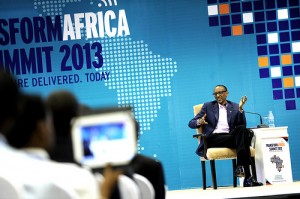
Transforming Africa

As many of you know I have been keeping an eye on what is happening in Africa when it comes to Internet connect and how it is and is going to radically change the landscape there. Africa just help the transform Africa Summit. There have been some great articles written on what was discussed at the summit. I thought I would just share some information via news reports and quotes that have me shaking my head in excitement.
Rwanda recently signed a $140 million (£87 million) deal with Korea Telecom, which will see the company deliver 4G LTE internet to 95 percent of citizens within three years. Despite 5,000km of fibre-optic cable already being laid in the country, only 8.3 percent of the Rwanda’s 12 million citizens are currently connected to the internet. The government is hoping that the rollout of 4G, which kicks off this week, will change this. (wired UK)
Nsengimana demoed the new 4G in action. In a side-by-side test, it reached speeds 90Mbps, while the 3G network managed just 0.5Mbps. For education, he said, this means the difference between being able to study texts online and enabling students to access multimedia and participate fully in online classrooms. (wired UK)(Bold by me)
“They should adopt a leapfrogging approach,” he said. “They should take advantage of broadband, because they are not impeded by legacy industries.” (wired UK)
Last year, 40 tablet computers were delivered to the children of two remote Ethiopian villages. The villagers were 100 percent illiterate—the kids had never seen road signs, product labels, or printed material of any kind.
Within weeks, they were singing their ABCs, picked up from the English-language learning software installed on the tablets. Within five months, some kid figured out that the tablets had built-in cameras—they had been disabled for ethical reasons—and hacked the Android operating system to activate them. (reason.com)
One Laptop Per Child considered the Ethiopian kids’ hack a success. “The kids had completely customized the desktop—so every kids’ [sic] tablet looked different. We had installed software to prevent them from doing that,†a contrite Ed McNierney, OLPC’s chief technology officer, told the MIT Technology Review. “And the fact that they worked around it was clearly the kind of creativity, the kind of inquiry, the kind of discovery that we think is essential to learning.â€
On Oct. 1, LAUSD pronounced its ed tech experiment temporarily out of control and admitted that several schools were in the process of attempting to pry the new tablets from their students’ clammy hands. (reason.com)
Both of the articles quoted above are worth a read and so are the links within them. At the same time Bill Gates was interviewed earlier this week about his thoughts on technology being a game changer around the world. It’s an interesting view point from a man who’s mission has been to make this world a better place. I agree with Bill that there are things that giving people a connection can’t solve…or can they? What if you know how to treat a disease? What if you learn how to keep disease down in your tride? What if you learn better birthing techniques by reading something on the web? I don’t know…that connection can be pretty powerful. It’s already overthrown governments and changing the GPD of countries in Africa which means more money for more medicine for more people.
What I love…is right now we’re approaching this from both ends. NGOs and Mr. Gates are hitting things like malaria head on…which is awesome…and now if we can get those same people an Internet connection we impower them to change and learn. To mean it’s not an either or right now but a both.







Just imagine if Google can get Loon up and running sooner than later. That would be a game changer.
[…] Read More: Transforming Africa […]